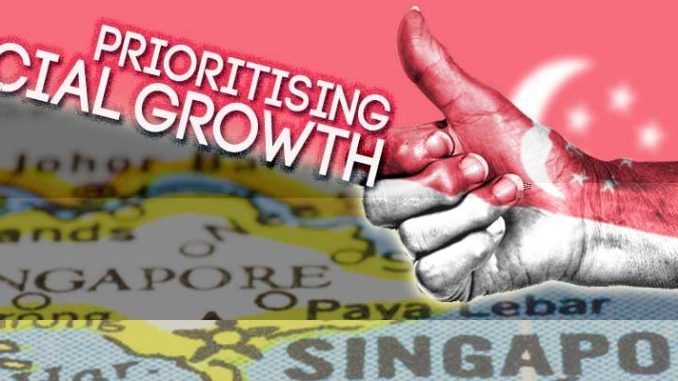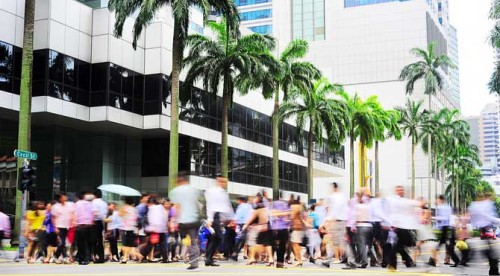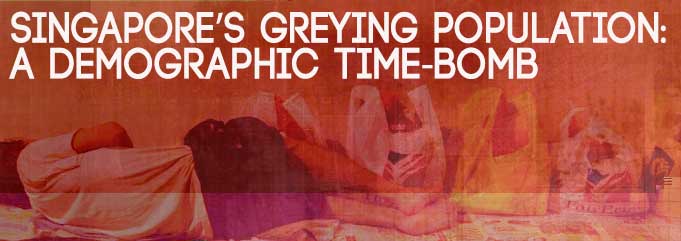
The old social contract between Singaporeans and the ruling People’s Action Party (PAP) granted the latter monopoly control over government in exchange for economic development. But Singaporeans have become increasingly dissatisfied with this arrangement. Singapore may have become a “first world” economy, but this rapid development has come at a high social cost that will leave many behind. Income inequality has gotten worse over the past decade; yet Singaporeans are working harder than ever before. Even so, all this sweat is not enough as the cost of living continues to spiral far ahead of wages.
The never-ending rat race
Some Singaporeans have resigned themselves to this unceasing daily grind. But larger numbers are taking action at the ballot box. In the 2011 General Elections, the PAP garnered 60.1% of the total votes, its lowest since Independence. To an outsider, the fact that the political opposition only won 6 out of 87 parliamentary seats sounds insignificant. But when you see the crowds that attend the opposition rallies and take into account the increasing number of young voters, there is a sense that the ground is slowly beginning to shift away from the ruling party.
If Singaporeans are no longer falling in line without question, then what have those in power done to tackle this threat to their hegemony? So far, the PAP has preferred the carrot to the stick. A national campaign was launched to engage Singaporeans and hear us out. This year, Prime Minister Lee Hsien Loong, in his annual National Day message, gave what many Singaporeans felt was his best speech. Acknowledging that high inequality threatened meritocracy, PM Lee promised reforms to make healthcare, public housing, and education more affordable and accessible for the lower-to-middle classes.

But as long as economic growth remains the key performance indicator, these policy initiatives will not be enough on their own to relieve the economic pressure that many Singaporeans are under. I propose that Singapore should aim instead for “social growth”. Economic growth aggregates individual income and productivity into collective national wealth. Social growth, on the other hand, centres on the quality of the relationships between people. High social growth places a premium on relationships that embody dignity, mutual respect, and fairness. If social growth is low, relationships are likely to be exploitative, humiliating, and marked by the domination of a stronger power over another.[quote]
Exploitation of foreign workers
An indicator of how far we have come in terms of social growth is how we treat other people, especially those who are disadvantaged relative to us. In this regard, Singapore does not fare very well. This is evident in the way we treat foreigners of a lower social status like foreign domestic helpers and construction workers. Singapore-based NGOs that deal with labour rights have reported numerous cases of exploitation where foreign workers have either not been paid, housed in inhuman conditions, or swiftly deported by employers when they are no longer needed.
But Singaporeans like myself do not need to look to our treatment of foreigners to see how much more social growth is needed. Early this year, the government published a policy paper that portrayed Singapore’s greying population as a demographic time-bomb. Elderly Singaporeans were implicitly depicted as unproductive and a drag on economic growth. The truth is that it is tough to be old in Singapore. Those of us who stay in public housing are familiar with the sight of elderly persons working hard to earn a few dollars everyday by recycling discarded aluminium cans and cardboard boxes. Perhaps we would become a better society if the worth of the elderly was not measured in terms of their economic output, but by their ability to share their life experience and history to the younger generation.

Keeping this sense of history alive is crucial for social growth. In order to ensure that the nation is on track towards the goal of economic progress, the PAP has had to erase the historical memory of Singapore and clear the debris of cultural tradition that stood in the way of economic efficiency. Recently, the government decided to demolish the historical Bukit Brown cemetery – where many of Singapore’s migrant pioneers are buried – to make way for a highway. To them, history obstructs economic progress and belongs in dusty archives. This is a mistake. A vibrant nation is comprised of people who are able to form meaningful social relationships with each other based on a shared heritage. If we forget the social bonds forged and tested in the past, then our relationships with each other today will be poorer because they will be defined only in economic terms.
A fair shot for all
Instead of trying to keep citizens in line, like workers along a conveyor belt, people should be given the space to lead their own version of the good life. In this way, we create our own historical thread in the national tapestry by binding it with the threads of others. A capable government is still necessary to ensure that each citizen has a fair shot, that each thread is of the same high quality as the others. Some people would pursue economic success; but many others would choose paths less trodden. This might make Singapore more messy and less efficient. But the social bonds that Singaporeans forge with each other will be drawn from a well of shared culture that is deeper than instrumental economic logic. With social growth, Singapore could become a country notable for fairness, dignity and a sense of community.
Alex Tham
Alex Tham is a Singaporean and currently doing his
graduate studies in sociology at Princeton University.
Kyoto Review of Southeast Asia, (Issue 14), Young Academics Voice, October 2013


This is a really interesting article. Good stuff!
Thanks for an inciteful piece.